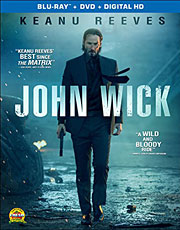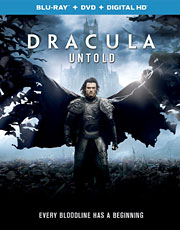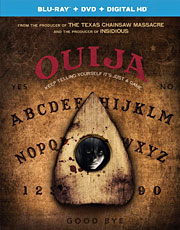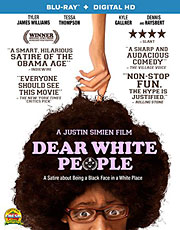Blu Tuesday: John Wick, Dracula Untold and More
Every Tuesday, I review the newest Blu-ray releases and let you know whether they’re worth buying, renting or skipping, along with a breakdown of the included extras. If you see something you like, click on the cover art to purchase the Blu-ray from Amazon, and be sure to share each week’s column on Facebook and Twitter with your friends.
WHAT: When his prized Mustang is stolen and his pet beagle (a final gift from his dying wife) is murdered, ex-hitman John Wick (Keanu Reeves) comes out of retirement to exact revenge on the one responsible – Iosef (Alfie Allen), the spoiled son of a Russian gangster (Michael Nyqvist) – and anyone else who gets in his way.
WHY: Keanu Reeves has made some great action movies (“Speed,” “The Matrix”), as well as some not-so-great ones, over the course of his career, and though “John Wick” isn’t quite good enough to be counted among the former, it’s a fun little genre flick destined for cult status. Reeves is certainly in his element as the soft-spoken hitman, piling up bodies by the minute and almost always finishing them off with a bullet to the head. (Seriously, there are more headshots in this film than you can count.) The movie does get a bit repetitive after a while due to the rinse-and-repeat nature of the fight sequences, but those scenes are also what makes it so giddily entertaining, featuring an old-school sensibility that focuses more on the kinetic energy of the action than fancy choreography or camera movement. It also boasts an impressive ensemble cast that includes Willem Dafoe, Ian McShane, John Leguizamo and Lance Reddick, not to mention Adrianne Palicki – who’s pretty much cornered the market on sexy, badass women – in an amusing supporting turn as a rival assassin. “John Wick” could have been really terrible, but it never takes itself too seriously, instead embracing the outlandish premise with such cool self-awareness that it practically dares you not to have a good time.
EXTRAS: In addition to an audio commentary with directors Chad Stahelski and David Leitch, there’s a behind-the-scenes look at the fight choreography and five additional production featurettes.
FINAL VERDICT: RENT
WHAT: Decades after being taken hostage as a teenager and forced to fight for the Ottoman Empire, Transylvanian prince Vlad the Impaler (Luke Evans) has put down his sword in order to rule his people. But when Turkish sultan Mehmed (Dominic Cooper) demands 1,000 youths for his army – including Vlad’s only son, Ingeras (Art Parkinson) – Vlad refuses to submit, instead making a deal with an ancient vampire (Charles Dance) to give him the power required to protect his land from Turkish retaliation.
WHY: It seems like everyone is getting an origin story these days, so it was only a matter of time before Hollywood treated its original bad boy to one of his own. Unfortunately, the last thing that anyone needed was another film that tries to humanize a classic villain with a backstory explaining why they broke bad, especially one as iconic as Dracula, because it completely undermines everything that makes him so fascinating. Refashioning Dracula as a misunderstood antihero is a difficult proposition on its own, and director Gary Shore doesn’t do himself any favors by having the Transylvanians speak with British accents. Whether it’s because Luke Evans was incapable of delivering a suitable accent, or Shore just wanted to move away from the stereotypical Dracula performance, it’s an odd and distracting decision, particularly when the rival Turks sound exactly as they should. Evans isn’t the worst choice to play Vlad, but while he has the right look and brooding presence, he delivers every line like he’s performing a Shakespearian adaptation of “300.” For all of its faults, however, “Dracula Untold” fails primarily for the same reason as Ridley Scott’s “Robin Hood” – the man before the legend isn’t as interesting as the legend himself. There’s a good reason this part of the Dracula lore remained untold, and it should’ve stayed that way.
EXTRAS: There’s an audio commentary by director Gary Shore and production designer Francois Audouy, scene-specific commentary by star Luke Evans, a video diary from the set, deleted scenes, an alternate opening and more.
FINAL VERDICT:
WHAT: After her best friend Debbie (Shelley Henning) is killed under mysterious circumstances, Laine (Olivia Cooke) convinces her other friends to try and contact Debbie’s spirit using a Ouija board. But when they unwittingly release an evil spirit in the process, they must figure out how to stop it before anyone else falls victim to its dark powers.
WHY: As far as movies based on board games go, “Ouija” is actually one of the more practical properties to receive the Hollywood treatment, because it’s more about name recognition than trying to adapt the mechanics of the game into a story, like what Peter Berg did with “Battleship.” In “Ouija,” the gimmicky spirit board is merely a plot device by which the group of dumbass teenagers conjure up the demon that will inevitably kill them. But for as annoying as the product placement may be (although strangely, it’s never officially referred to as a Ouija board), there are much bigger problems, like the fact that it’s an incredibly bland horror film with very few scares, lame characters and a story that makes little sense. The main protagonist barely sheds a tear whenever one of her friends is killed (even the deaths themselves are uninspired), while the shocking lack of parental or police involvement is baffling. Teenagers are dying left and right, and yet with the exception of Debbie’s death, nobody in the town seems to care. Then again, when the characters are as forgettable as they ones in “Ouija,” that’s not a big surprise.
EXTRAS: There’s a trio of brief featurettes, but nothing substantial.
FINAL VERDICT: SKIP
WHAT: A group of black students – activist Sam (Tessa Thompson), gay journalist Lionel (Tyler James Williams), overachiever Troy (Brandon P Bell) and wannabe celebrity Coco (Teyonah Parris) – navigate campus life and racial politics at a predominantly white Ivy League school.
WHY: Justin Simien’s directorial debut may be marketed as a clever satire on race relations, but it’s really just a wannabe Spike Lee joint that provides him with an avenue to get up on his soapbox and take potshots at white and black culture. Not only is it extremely irritating to have listen to black students at an Ivy League university complain about how underprivileged they are, but the white students are so dense and racially insensitive that it’s hard to believe this fictional university is as prestigious as it claims to be. Most of the characters are bigger stereotypes than the ones the movie is trying to address, and with the exception of Tessa Thompson’s multiracial filmmaker, none of them are interesting enough to make their stories worth telling. There are a handful of amusing one-liners sprinkled throughout Simien’s script, but the film feels more like a mouthpiece for those YouTube-worthy observations than a social commentary with any real bite to it. “Dear White People” feels too safe at times to be as relevant as it pretends to be, and though it works in fits and starts, it’s just another overrated Sundance darling that’s worth seeing mainly for Thompson’s breakout performance.
EXTRAS: In addition to a pair of audio commentaries (one with writer/director Justin Simien, and another with Simien and his cast), there’s a making-of featurette, deleted scenes, outtakes and a series of parody videos.
FINAL VERDICT: RENT
Related Posts
Posted in: Entertainment, Movies
Tags: Blu Tuesday, Dear White People, Dracula Untold, John Wick, new Blu-rays, Ouija












